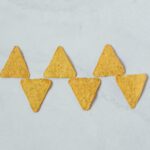Yes, it is safe for dogs to eat pancakes. However, ensure that you only feed it to them in moderation. In fact, when cooked correctly, pancakes contain eggs which are packed with protein. That said, avoid overfeeding your dog, as plain pancakes also contain white flour and sugar, which can lead to obesity and other health issues in dogs.

Safe: This food is generally considered safe by the veterinary community. Dogs can eat this food sometimes or in small amounts but contains little to no nutritional value.
| Food Safety | Safe to eat in moderation |
|---|---|
| Nutritional Value | Protein from eggs, fiber and potassium from topping like bananas and apples |
| Potential Risks | Obesity, diabetes, stomach issues |
How Many Pancakes are Safe for Dogs?
Even though pancakes might not harm your dog, it’s best to avoid overfeeding them. Plain pancakes contain a ton of carbs, thanks to white flour and sugar. Furthermore, pancake topping such as chocolate chips can be toxic for dogs and lead to kidney failure. Not to mention, maple syrup is full of sugars and can lead to obesity in dogs.
What Happens if Your Dog Eats Too Many Pancakes?
If you accidentally feed your dog too many plain pancakes, you won’t see any negative side effects immediately. However, if you continue to give your dog pancakes every day, it might lead to digestive problems, especially if your dog has problems digesting gluten. Furthermore, topping such as maple syrup and chocolate chips can be toxic for your dog.
How to Feed Pancakes to Dogs
You can easily whip up a dog-friendly recipe with little effort if you’re thinking about giving your dog pancakes as an occasional treat. Ultimately, it mainly has toppings such as chocolate chips, maple syrup, and butter, which can be dangerous for your dog.
To make dog-friendly pancakes, ditch white flour and white sugar for gluten-free flour and no added sugar. Furthermore, you can smear a teaspoon of peanut butter to make it more delicious. Peanut butter doesn’t contain artificial sweeteners like xylitol and is safe for dogs.
You can also try adding fruits such as apples and bananas to incorporate more nutrients such as fiber and potassium into your dog’s diet.
Common Pancake Ingredients
- White flour-All types of pancakes contain white flour, which can lead to obesity and a host of digestive issues in dogs. However, you can easily substitute this with gluten-free flour to make your pancakes more dog friendly.
- Sugar-Sugar is a highly addictive substance for dogs. Overfeeding on sugar can lead to obesity and other health problems in dogs. So, consider ditching sugar altogether in your pancake recipe.
- Chocolate chips-Chocolate is extremely toxic for dogs and can cause liver problems. So, it’s best to avoid this ingredient entirely.
- Salt-Of course, pancake batter only contains a pinch of salt. However, it’s best to eliminate it from the recipe entirely. This is especially the case if you feed your dog pancakes every day.
- Eggs-Eggs are perfectly safe for dogs. In fact, they contain high amounts of protein.
Frequently Asked Questions
-
Plain pancakes are completely safe for dogs. However, adding sugar syrups can lead to obesity and digestive issues in dogs.
-
Yes, it’s perfectly safe for dogs to eat pancakes without syrup. Removing sugary syrups from your pancake recipe removes excess sugar from your dog’s diet.
-
While cooked pancakes are perfectly fine for dogs, feeding them raw pancake batter can lead to stomach problems. This is because raw batter contains raw eggs, which might contain bacteria.







